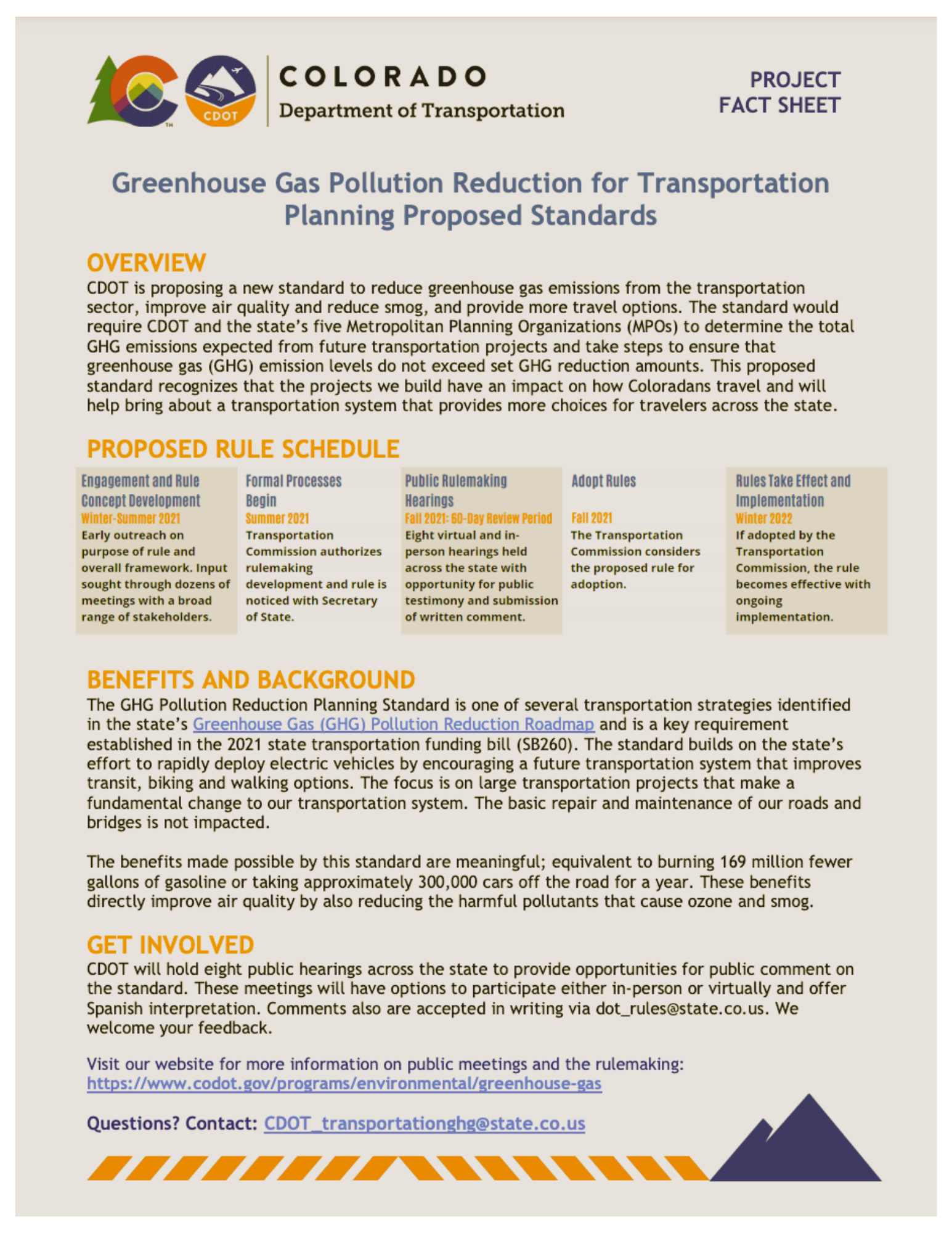In addition to our city’s recently adopted an ambitious greenhouse gas emission reduction goal of 80% by 2030, as outlined in the Our Climate Future Plan, it coincides with the state’s 2019 legislative session where it passed Colorado House Bill 19-1261, the Climate Action Plan to Reduce Pollution (“Climate Action Plan”). The state plan calls to reduce statewide greenhouse gas (GHG) pollution as follows: 26% by 2025, 50% by 2030, and 90% by 2050 (from 2005 levels).
While a 2021 State Greenhouse Gas Pollution Reduction Roadmap shows that significant progress toward meeting the 2025 and 2030 goals has been made, the analysis showed that additional actions are needed to reach the targets. Particular key findings indicate:
- The largest sources of GHG pollution in Colorado are transportation, electricity generation, oil and gas production, and fuel use in residential, commercial and industrial spaces.
- Achieving Colorado’s 2025 and 2030 GHG emissions targets is feasible with existing technologies but will require actions, laws, and policies beyond those Colorado has taken already.
- Achieving the 2030 goals will rely on deep reductions in pollution from electricity generation by continuing the transition to renewable energy, as well as deep reductions in methane pollution from the oil and gas industry, which makes up the largest source of non-combustion emissions in the state.
- Making changes to transportation planning and infrastructure to reduce growth in driving is an important tool.
The last bullet is of particular interest to Bike Fort Collins, as we interpret this last bullet to mean, reducing single occupancy vehicle trips in favor of bicycles—and ensuring appropriate bicycle infrastructure is planned for and developed to not only incentivize more riding, but also support the influx in ridership that will ensue. The proposed Rules revision (below) will help with this, but your input is needed.
PROPOSED RULEMAKING FOR RULES GOVERNING STATEWIDE TRANSPORTATION PLANNING
The Colorado Department of Transportation (CDOT) on behalf of the Transportation Commission of Colorado (Commission) filed a Notice of Proposed Rulemaking with the Colorado Secretary of State to consider revisions to the rules (“The Rules”) governing the statewide transportation planning process and transportation planning regions regions, 2 CCR 601-22, that proposes the establishment of a new standard to reduce GHG pollution from the transportation sector that will improve air quality, reduce smog, and provide more sustainable options for travelers across Colorado.
These revisions would be made to Section 8 of the Rules. And, while there are many documents to reference about this proposal, here’s an excerpt from the Statement of Purpose that provides good context:
The Rules, governing the statewide planning process, emphasize Colorado’s continually greater integration of multimodal, cost-effective, and environmentally sound means of transportation which leads to cleaner air and reduced traffic. The Rules reflect the Commission’s and the Department’s focus on multimodal transportation projects including highways, transit, rail, bicycles and pedestrians. Section 8 of these Rules establishes an ongoing administrative process for identifying, measuring, confirming, and verifying those best practices and their impacts, so that CDOT and MPOs can easily apply them to their plans in order to achieve the pollution reduction levels required by these Rules.
The specific purpose of this rulemaking is to establish Greenhouse Gas (GHG) pollution reduction planning levels for transportation within Section 8 of these Rules that will improve air quality, reduce smog, and provide more sustainable options for travelers across Colorado. The purpose of these requirements is to limit the GHG pollution which would result from the transportation system if the plan was implemented, consistent with the state greenhouse gas pollution reduction roadmap. This is accomplished by requiring CDOT and MPOs to establish plans that meet targets through a mix of projects that limit and mitigate air pollution and improve quality of life and Multimodal options. CDOT and MPOs will be required to demonstrate through travel demand modeling and approved air quality modeling that statewide and regional aggregate emissions resulting from its state or regional plans do not exceed a specified emissions level in total. In the event that a plan fails to comply, CDOT and MPOs have the option to commit to implementing GHG Mitigation Measures that provide travelers with cleaner and more equitable transportation options such as safer pedestrian crossings and sidewalks, better transit and transit-access, or infrastructure that supports access to housing, jobs, and retail.
Examples of these types of mitigations, which also benefit quality of place and the economic resilience of communities, will include but not be limited to: adding bus rapid transit facilities and services, enhancing first-and-last mile connections to transit, adding bike-sharing services including electric bikes, improving pedestrian facilities like sidewalks and safe accessible crosswalks, investments that support vibrant downtown density and local zoning decisions that favor sustainable building codes and inclusive multi-use facilities downtown, and more. The process of identifying and approving mitigations will be established by a policy process that allows for ongoing innovations from local governments and other partners to be considered on an iterative basis.
YOUR INPUT IS NEEDED
Per the Commission’s Notice of Proposed Rulemaking, it plans to hold eight (8) hearings across the State to hear testimony and receive comments—with a Fort Collins hearing scheduled for September 30. The public hearings will be conducted in a hybrid format, both in-person and virtually. Virtual attendees need to register through these registration links, so they can provide instructions on how you can join the hearings of your choice virtually and provide testimony if you wish.
When: September 30, 2021, 3:00-7:00 p.m.
Where: Christ United Methodist Church, 301 East Drake Road, Fort Collins, CO 80525
Virtual Attendance: Register Here
Written comments can also be submitted Please dot_rules@state.co.us on or before 5:00 p.m. on October 15, 2021. All comments received will be posted on CDOT’s Rulemaking Web Page and will be available for review during the public comment period.
Note: the following information will be redacted from comments for data privacy prior to posting online: first and last names, contact information, including business and home addresses, email addresses, and telephone numbers.

